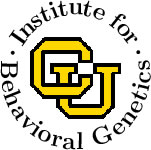
|
|
Twin StudiesBelow are summaries of ongoing research projects we are conducting with twins and their families. For more information on any project please contact us. |
Longitudinal Twin Study (LTS) This longitudinal study began recruiting twins in 1985 and recruitment lasted for a period of 7 years. The oldest twins are now 17 and the youngest are 11. Each year the twins are contacted for a different type of interview. We have conducted home visits, lab visits, and telephone interviews that cover many different aspects of human behavior and development. The wealth of data from these studies has led to the publication of over 75 journal articles and a book in 2001. Colorado Adolescent Twin Survey (CATS) In this study, twins fill out questionnaires on a range of topics including information about their personality, history of substance use, and demographics. These twins are contacted through the Colorado Twin Registry, which is developed with assistance from the Colorado Departments of Health and Education. This study began in 1997, and thus far over 1000 families have participated. The youngest respondents are 12 years old whereas the oldest twin pairs are in their 60's. Community Twin Study (CTS) For this project twins ages 12-18 and their siblings throughout Colorado participate in a 2 1/2 hour interview that covers questions about personality, behavior, intelligence and various mood and conduct disorders. Participants that meet certain criteria are then contacted for a more extensive follow up interview. Colorado Reading Project (CRP) Since its inception in 1982, the CRP has worked with over 1400 twin pairs to assess and find factors that contribute to the development of various reading disabilities. This testing is conducted over 2 days with twin participants contacted throughout school districts in Colorado. Recruitment for this project is ongoing. Longitudinal Twin Study of Reading Disability (LTSRD) This new study is a 5-6 year follow up with 12-25 year-old twins who participated in the CRP. It is the first time a longitudinal study has been conducted with twins who have reading disorders. The initial study calls for an abbreviated battery that assesses cognitive, behavioral and reading abilities and will enroll 200 twin pairs and 50 of their siblings. Longitudinal Study of Early Reading Development (LSERD) This study, a collaborative effort with the University of New England in Australia and Stavanger University in Norway, is designed to study genetic and environmental influences on early reading and attention development. Identical and Fraternal twins are being tested in preschool for pre-reading skills, and after kindergarten, first grade, and second grade for the development of early reading, spelling, and related cognitive skills. Enrollment is ongoing for same sex twins south of Fort Collins and north of Colorado Springs. Adult Twin Smoking Study (ATSS) New this spring, the ATSS looks at smoking behavior in twin smokers over 18 years of age who live in Colorado. So far less than 20 twin pairs have participated, mostly due to the selective criteria necessary to participate. While in the lab, participants in this study smoke cigarettes and perform a variety of tasks while their heart rates are monitored. |
